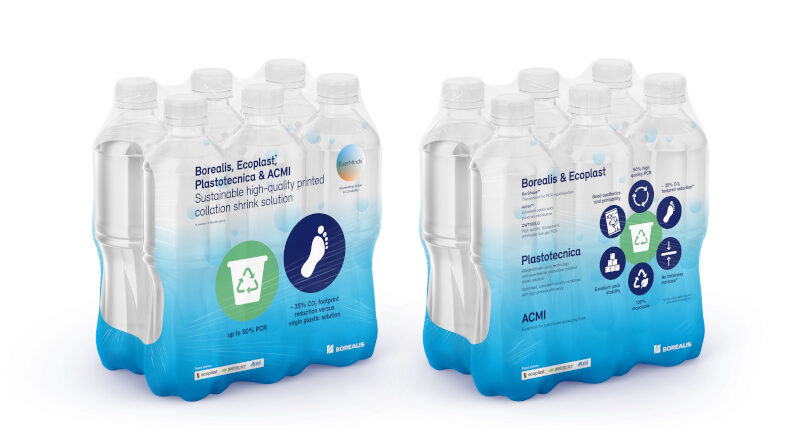Borealis and value chain partners develop more sustainable flexible packaging formats containing 50% PCR
Borealis announces that two separate collaborations with long-standing value chain partners have resulted in new, fully recyclable flexible packaging formats, which incorporate 50% post-consumer recyclate (PCR). The use of new low density polyethylene (LDPE) PCR grades developed and produced by mechanical recycling expert Ecoplast, a member of the Borealis Group, have made it possible to achieve a 35% carbon footprint reduction in raw material production when compared to virgin polyolefins, whilst maintaining the same film thickness as with virgin materials. Co-operation in the spirit of EverMinds is accelerating plastics circularity by fulfilling industry demand for sustainable flexible packaging solutions with lower environmental impact.
Plastotecnica, a major European producer of polyethylene (PE) packaging; and ACMI SpA, a leading Italian manufacturer of high-tech and flexible bottling and packaging lines and machines, worked together with Borealis to incorporate more PCR material into the multilayer shrink wrap of a beverage multipack. In developing the application, the partners were able to identify the ideal material solution to achieve mechanical and packaging performance (particularly pack stability) whilst obtaining good film optics and printability: the soon-to-be-launched LDPE PCR grade Ecoplast CWT 100VL with low gel content; BorShape FX1003, a mechanical booster based on the proprietary Borstar technology; and Anteo FK2715, a key ingredient for ensuring higher performance and more sustainable multilayer applications. The result is a fully recyclable film containing 50% PCR and a 35% lower carbon footprint in the raw material production process, says Borealis. The shrink film packaging trials were conducted by ACMI.
“Working together with Borealis and ACMI enables us to come nearer to achieving our own objectives with regard to both sustainability and technological innovation,” says Valentina Betto, R&D and Sustainability manager at Plastotecnica. “We have been able to make real progress towards reaching specific goals. These include offering our customers solutions containing high levels of recycled material, exploiting downgauging potential to reduce film thickness, optimising processing parameters and performance, and minimising waste wherever possible.”
As a member of the Rani Group, a leading Nordic producer of smart packaging solutions, Rani Plast used its film and production expertise to work together with polymers experts at Borealis to develop a film structure for more sustainable flexible packaging used for tissue paper products such as kitchen roll (paper towels) and toilet paper. As an improved version of its predecessor NAV 101, the soon-to-be-launched Borealis LDPE PCR grade NAV 101L is claimed to perform well when it comes to balancing gel performance and circularity. Manufactured using household post-consumer and commercial waste, its gel content is lower in order to provide good processability and is also claimed to offers good printability and optics. Combined with the Borstar technology-based mechanical booster BorShape FX1003, the grade delivers the intended mechanical performance, thus enabling the incorporation of more than 50% PCR content without increasing film thickness. Finally, Anteo FK2715 is said to provide enhanced sealing, good optics and reinforced stiffness performance.

